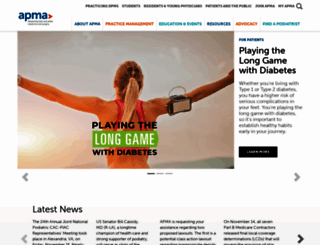Home - APMA MAIN
Page Load Speed
1.4 sec in total
First Response
51 ms
Resources Loaded
1.2 sec
Page Rendered
242 ms

About Website
Welcome to apma.org homepage info - get ready to check APMA best content for United States right away, or after learning these important things about apma.org
American Podiatric Medical Association (APMA) is the leading resource for foot and ankle health information for both patients and Physicians.
Visit apma.orgKey Findings
We analyzed Apma.org page load time and found that the first response time was 51 ms and then it took 1.4 sec to load all DOM resources and completely render a web page. This is quite a good result, as only 30% of websites can load faster.